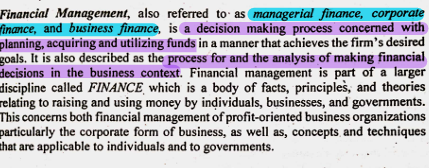Chapter 1-3
1/28
There's no tags or description
Looks like no tags are added yet.
Name | Mastery | Learn | Test | Matching | Spaced | Call with Kai |
|---|
No analytics yet
Send a link to your students to track their progress
29 Terms
financial management
also referred to as managerial finance, corporate finance, and business finance
it is a decision making process
goal of financial management
to make money and add value for the owners
to maximize the current value per share of the existing stock
investment decisions
decision that determines how scarce or limited resources in terms of fund
financing decisions
decision that asserts the mix of debt and equity chosen to finance investments should maximize the value of the investments
dividend decisions
decision concerned with the determination of quantum profits
accounting
discharges the function of systemic recording of transactions relating to the firm’s activities
looks backwards in decision making
finance
uses accounting data for analysis review
looks forward for decision making
microeconomics
economic decisions of individuals and firms
small-scale
macroeconomics
provides insight to the overall economic climate
large-scale
strategic financial planning
long-range
focused on financial forecasting and policy formulation
strategic/business plan
reflects how a company plans to achieve its goals and objectives
short-term objectives
maximization of ROI
growth in earnings per share
minimization of finance charges
long-term objectives
growth in the market value of equity shares
survival and growth of the firm
owner’s perspective
primary goal
maximize shareholder or owners wealth
stakeholder’s perspective
secondary consideration
emphasizes social responsibility over profitability
investing
managing the firm’s assets
decisions: Capital budgeting (project selection), determining current vs. fixed asset mix, and working capital levels (inventory, receivables).

financing
obtaining and managing necessary funds
decisions: Optimal capital structure (debt-equity mix), cost of raising funds, and issuance of financial instruments (shares, bonds).
operating
Day-to-day management of short-term assets and liabilities.
Issues: Setting levels of cash/inventory, credit policy (selling on credit), and source of short-term financing.
financial manager
makes decision involving planning, acquiring, and utilizing funds which involve risk-return trade-off
corporate governance
process of monitoring managers and aligning their incentives
with shareholder goals.
monitors (inside)
board of directors,
monitor (outside)
Analysts, Investment Banks, Credit Agencies, and Government (SEC, BIR, BSP).
board of directors
appointed to represent shareholders’ interest
external auditors
they examine the firm’s accounting systems and comment on whether the FS are presented fairly
investment analysts
they keep tract of the firm’s performance, conduct their own evaluations of the company’s activities and report to the investment community
investment banks
they help firms access capital markets
credit analysis
examine a firm’s financial strength for its debt holders
government
they monitor the business activities through various government agencies
ethics
it is the primary importance in any practice of finance